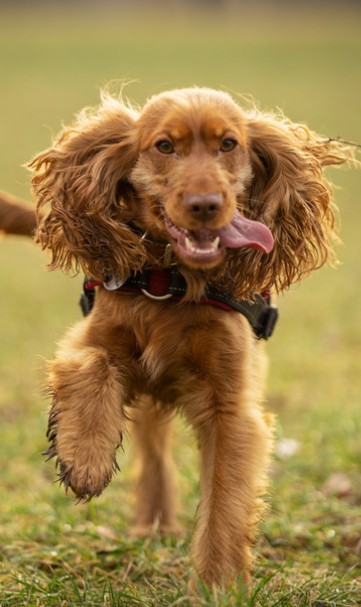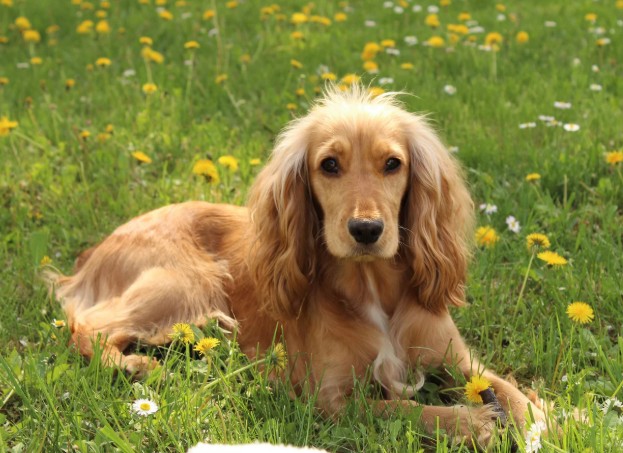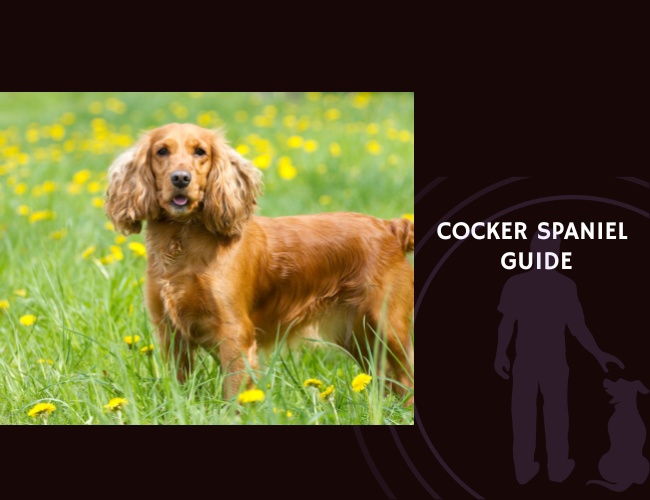Introduction to Cocker Spaniels
Meet the Cocker Spaniel Breeds
Cocker Spaniels come in two well-loved varieties: the American Cocker Spaniel and the English Cocker Spaniel. While they share a common heritage and many delightful traits, each type has its own special charm. The American version is smaller, with a rounder head and softer expression. The English Cocker Spaniel often has a longer muzzle and a slightly larger build. Both are famous for their flowing coats and soulful eyes, which have won over countless dog lovers around the world.
A Proud Heritage as Hunting Companions
Did you know that Cocker Spaniels were originally bred as expert hunting dogs? For centuries, they were partners to hunters in the field, skilled at flushing birds out from hiding places and retrieving game with a soft touch. These instincts made them energetic, attentive, and eager to please, traits that still shine through even if your Cocker Spaniel is just chasing a tennis ball at the park!
Why Families Love Cocker Spaniels
Today, both American and English Cocker Spaniels are cherished as family companions. Their affectionate, emotionally sensitive, and people-oriented personalities make them wonderful household pets. They are famously gentle with children, loyal to their families, and quick to pick up on human moods. If you want a dog that stays close and offers comfort after a hard day, the Cocker Spaniel is a smart choice.
Their playful spirit also means they enjoy games, walks, and cuddles in equal measure. But be warned: these dogs do not like to be left alone for long. Their need for human company is part of their unique appeal.
With a strong history and an even stronger bond with humans, Cocker Spaniels bring joy, energy, and plenty of snuggles to the homes lucky enough to have them. Ready to learn what makes their character and behavior so unique? Let’s dive in!
Character & Behavior
Affectionate and People-Oriented Nature
Cocker Spaniels are often described as affectionate and deeply people-oriented companions. These dogs thrive on human interaction. They want to be close to you—either snuggled up on the couch or following your every step. If you love a dog that connects emotionally and is always ready for a cuddle, a Cocker Spaniel will feel right at home with you. Their cheerful attitude and eagerness to please are just part of their charm.
Emotional sensitivity is at the heart of this breed’s behavior. They quickly pick up on your mood and are happiest in a stable, predictable environment. This trait makes them intuitive family pets. However, it also means they can become anxious or withdrawn if there’s tension or inconsistency at home.
Differences Between American and English Varieties
Though both American and English Cocker Spaniels share this devoted temperament, there are some behavioral differences. The American variety often displays more pronounced “puppy-like” qualities, remaining playful and emotionally dependent even as adults. You’ll find they may seek attention more often and can be more demanding of your time.
On the other hand, English Cocker Spaniels may show a slightly more independent nature, with a stronger focus on tasks or play. They typically retain a greater working drive, showing more curiosity and sometimes a higher tolerance for being left alone—but only for short periods, as both breeds are social.
Common Vulnerabilities
Like many emotionally sensitive breeds, Cocker Spaniels are vulnerable to certain behavioral challenges. Separation anxiety is one of the most common issues. A Cocker Spaniel left alone may become distressed, barking, chewing, or showing destructive behavior. Consistent daily routines and gradual departures can help minimize these feelings.
Another frequently observed issue is submissive urination, especially in puppies. This tends to happen when they feel overwhelmed by excitement or are faced with a new person or situation. With patience, gentle interactions, and confidence-building, most dogs grow out of it.
Cocker Spaniels’ deep connection to family makes them wonderful, loyal pets, but their sensitivities must be considered to keep them happy and emotionally healthy.
Next, we’ll explore how reward-based training methods support their sensitive nature, helping you and your Cocker Spaniel succeed as a team.
Training & Education
Reward-Based Methods for Sensitive Learners
Cocker Spaniels are eager learners who thrive on positive feedback. Because of their emotionally sensitive nature, harsh corrections or unpredictable handling can lead to defensive or withdrawn behavior. The most effective approach is reward-based training, which uses treats, verbal praise, or toys to reinforce good behaviors. Have you ever noticed how your Cocker Spaniel’s eyes light up when you say “good dog!” or offer a tasty bite? That enthusiasm is your secret training tool! Creating a calm, low-pressure training environment and using a gentle voice helps build trust and ensures your dog remains engaged and happy throughout the process. Remember, consistency is key—repeat cues and rewards often for best results.
Early Socialization Builds Confidence
Exposing your Cocker Spaniel puppy to a wide range of people, sounds, animals, and environments from an early age is essential. Early and consistent socialization helps prevent issues like fearfulness, separation anxiety, and submissive urination later on. Think of socialization as your dog’s “life-skills class.” Positive outings—such as walks in parks, meeting calm dogs, and supervised playtime—teach your pup that the world is friendly and safe. This supportive foundation lays the groundwork for a confident adult dog and fosters lasting emotional stability.
Keeping Minds Busy: Mental Stimulation
A bored Cocker Spaniel can become mischievous, chewing things or barking excessively. Their intelligence and curiosity need an outlet. Try scent games, simple agility courses, or classic retrieval games—these activities tap into their natural instincts as former hunting dogs. Puzzle toys and treat-dispensing gadgets are also fantastic for solo play. Switching up daily activities and introducing new challenges keeps their minds active and spirits high.
By tailoring your training approach to their unique temperament and providing plenty of mental engagement, you’ll help your Cocker Spaniel learn, grow, and enjoy everyday life to the fullest.

Nutritional Recommendations
Meeting Dietary Needs at Every Life Stage
Cocker Spaniels are lively yet sensitive dogs whose dietary requirements shift over the course of their lives. From playful puppies to dignified seniors, it’s important to offer food matched to their age, size, and daily activity. Young puppies need calorie-dense meals that promote proper growth, while active adults do best with balanced formulas containing proteins, carbohydrates, and essential fatty acids. Seniors often require lower-calorie diets to help maintain a healthy weight as their metabolism slows down.
It’s easy to overfeed these affectionate canines, especially since they can be persuasive when asking for extra snacks. Obesity is a common issue, especially in neutered dogs or those who do not get enough exercise. Remember to measure meals carefully, stick to regular feeding times, and reserve treats for training or special occasions. If you wonder if your Cocker Spaniel is eating the right amount, your veterinarian can offer supportive guidance tailored for your dog’s unique needs. 😊
Coat and Skin Nutrition
A glossy, lush coat and healthy skin are hallmarks of a well-cared-for Cocker Spaniel. Long-haired varieties, in particular, benefit from nutrients like omega-3 fatty acids, biotin, and vitamin A. These help reduce shedding, minimize skin issues, and maintain that beautiful show-ring shine. Ask your vet about safe fish oil or flaxseed oil supplements, which you can add to your dog’s regular meals.
Allergy Awareness and Food Choices
Did you know that food allergies are more common in the Cocker Spaniel world than some folks realize? Symptoms like constant itching, upset stomach, or persistent skin problems might signal a food intolerance. If these arise, switching to a “limited-ingredient” diet makes it easier to detect and remove the culprit ingredients. Consulting a professional is advisable—they can help with supportive management and long-term success.
Dental and Training Considerations
Dental health often gets overlooked, but kibble that’s appropriately sized and textured helps maintain cleaner teeth. Pair this with routine dental checkups to ward off common dental concerns. And don’t forget: treats are fantastic for training but should count towards the daily calorie total.
Caring for your Cocker Spaniel goes beyond the food bowl, but it all starts with informed, professional, and supportive nutrition routines.
Health Concerns & Disease Prevention
Cocker Spaniels are a loving and energetic breed, but they also have some breed-specific health concerns. Understanding these risks and taking preventative measures can help your dog stay happy and healthy. Let’s take a closer look at what you need to know to support your furry friend.
Common Health Issues
One of the most frequent health problems for Cocker Spaniels is ear infections. Their long, floppy ears trap moisture and limit airflow, making them prone to bacteria and yeast growth. Regular ear cleaning is essential to avoid otitis externa (outer ear infection). Keep an eye (and nose!) out for any odor or redness, and consult your vet if you notice problems.
Eye health is another area of concern. Diseases such as progressive retinal atrophy (PRA), cataracts, and glaucoma can affect both American and English Cocker Spaniels. These conditions can lead to vision loss if not caught early. Annual veterinary eye exams help catch issues before they become serious.
Orthopedic problems like hip dysplasia and patellar luxation sometimes occur, causing pain and difficulty moving. For breeding dogs, joint screening is recommended to lower the risk for puppies. Regular gentle exercise and maintaining a healthy weight can also help protect their joints.
Autoimmune diseases, including hypothyroidism and hemolytic anemia, have been seen in some Cocker Spaniel lines. While less common, it is important to watch for unusual symptoms such as lethargy, unexplained weight changes, or persistent illness.
Prevention and Veterinary Care
Proactive care is Informative and Professional. Here’s how you can support your Cocker Spaniel’s well-being:
- Clean and check ears weekly to prevent infection.
- Schedule yearly eye exams to detect problems early.
- Keep your dog at an ideal weight to help joints and overall health.
- Ask your veterinarian about screening for orthopedic or autoimmune diseases if your dog shows symptoms.
- Keep up with vaccinations, parasite prevention, and regular health checks.
Good care and early intervention help your Cocker Spaniel live a long, comfortable life. With the right support, you can enjoy many healthy years together! 😊
Next, we’ll focus on how your Cocker Spaniel’s lifestyle and daily needs play a role in their overall well-being.
Soft. Sensitive. Soulful.
Velvet Heart. Cocker Spaniels melt hearts with their gentle presence and expressive eyes. Whether American or English, they bring warmth, playfulness, and emotional closeness into everyday life. These aren’t just pets — they’re emotional companions with silky fur and deep loyalty.
Emotion Reader. Few breeds are as attuned to your emotions as the Cocker Spaniel. Sensitive to tone, tension, and touch, they flourish in homes built on kindness, routine, and connection. Harshness shuts them down. Trust brings them to life.



Closeness Craver. These dogs don’t just want attention — they need it. Alone time weighs heavy on them, and they thrive on family presence. If you’re looking for a dog that sticks close, listens with their heart, and lives to be near you, this is your breed.
Lifestyle & Exercise Needs
Daily Exercise and Activity
Cocker Spaniels are lively and enthusiastic dogs who need daily physical activity to stay healthy and happy. You will want to set aside 60–90 minutes each day for exercise. This can include brisk walks, easy jogs, or play sessions in a fenced yard. Many owners notice that their Cocker Spaniel loves to chase a ball, play retrieval games, or join family hikes. Unsure what activities are best? Scent work, gentle agility practice, and puzzle games add variety and keep their sharp minds engaged too.
Supervised free movement, like exploring a secure garden, lets your dog use their senses and burn energy. Because their joints can be vulnerable, swimming is another great, low-impact choice for fun and fitness. Remember: Keeping your Cocker Spaniel active is key for both their weight management and overall well-being.
The Value of a Stable Home
These affectionate dogs thrive best in stable, predictable home settings. A calm environment with regular routines will help prevent unwanted behaviors and anxiety. Cocker Spaniels notice changes, so a peaceful household full of positive attention helps them feel safe. If you have a busy life, consider arranging for a family member or pet sitter to visit. Cocker Spaniels do not cope well with being left alone for long hours, as this can lead to stress or destructive habits.
Social and Human Interaction Needs
Cocker Spaniels are true “people dogs.” They need affection, reassurance, and your company each day. Play, gentle petting, and making them part of family activities help nurture their people-oriented nature. Encouraging well-managed interactions with other pets and visitors from a young age boosts their social skills and builds confidence. Sometimes, a friendly canine playmate can also offer comfort when you are out.
Giving your Cocker Spaniel a fulfilling daily routine isn’t just about physical movement. It’s about emotional support and gentle guidance, forming the foundation for a happy, stable life together. 🐾
Next, let’s consider the importance of consistent grooming and maintenance as part of your Cocker Spaniel’s care.
Grooming & Maintenance
Keeping the Coat Clean and Mat-Free
Cocker Spaniels are famous for their beautiful, silky coats. But behind that glamour lies a real commitment: regular brushing is a must. For most Cocker Spaniels, thorough brushing two to three times a week will help prevent mats and tangles. Long-haired Cocker Spaniels—especially those with show-style coats—often need daily brushing to keep their fur smooth and knot-free. Using a slicker brush or a metal comb, work through the hair gently, paying special attention to the ears, legs, and belly where tangles tend to form. Consistent grooming helps avoid painful mats and keeps the coat looking its best.
Bathing your Cocker Spaniel once a month is usually enough, but feel free to adjust based on your pup’s activity level. Always use a gentle dog shampoo to protect sensitive skin.
Ear Care: Preventing Infections
Those iconic, floppy ears are adorable, but they come with some challenges. Cocker Spaniels’ pendulous ears limit air circulation, trapping moisture that can cause ear infections. Clean your dog’s ears weekly with a vet-approved ear cleaner. Gently wipe out dirt and excess wax—never insert anything deep into the ear canal. If you notice redness, discharge, or a bad smell, this might be a sign of infection, so call your vet right away. Regular ear care is one of the most supportive and professional things you can do for your furry friend’s long-term health.
Differences Between American & English Varieties
While both types require steady grooming routines, the American Cocker Spaniel typically has a fuller, longer coat needing more frequent brushing and trimming. The English Cocker’s coat tends to be slightly less dense, so mats form less quickly, but routine care is still essential.
Tools and Techniques for At-Home Grooming
Setting up a grooming kit at home is straightforward:
- Slicker brush and metal comb for detangling
- Rounded-tip scissors or a clipper for safe trimming
- Dog-specific shampoo for bathing
- Ear cleaner and soft cotton pads
Some owners choose to schedule professional grooming every couple of months, especially for complex trims. Don’t forget—making grooming a positive experience with treats and praise keeps your Cocker Spaniel looking forward to spa day! 😊
Establishing these routines ensures your companion looks and feels their best, making every tail wag a happy one.

Enrichment & Mental Stimulation
Keeping your Cocker Spaniel’s mind busy is just as important as meeting their physical needs. Ever noticed your dog inventing their own games in the backyard? That’s a sign they crave mental engagement! A well-stimulated Cocker Spaniel is not only happier but far less likely to develop unwanted behaviors like excessive barking or destructive chewing.
Engaging Toys and Puzzles
To unlock their best behavior, provide a variety of stimulating toys. Puzzle feeders, treat-dispensing balls, and interactive tug toys all challenge your dog’s problem-solving skills. Look for toys that encourage nose work, such as snuffle mats or scent-based puzzles, to tap into their excellent sense of smell. Rotating toys weekly keeps things interesting and prevents boredom.
Scent Work and Retrieval Games
With their roots as hunting and flushing dogs, Cocker Spaniels love games that mimic searching and retrieving. Hide favorite treats or small toys around the house or garden for your dog to sniff out. Start with easy hiding spots, then gradually make it tougher as your dog gains confidence. Classic fetch is also a winner, especially when played in a secure area where your pup can sprint safely. These activities give them the Informative and Professional support they need to express their natural instincts while bonding with you.
Creating a Stimulating Environment
A supportive environment boosts your dog’s confidence and emotional well-being. Try setting up new obstacles or rearranging familiar furniture to encourage gentle exploration. Invite your Cocker to join you in daily activities—many love learning new tricks or simply helping out during family routines. Positive social interactions with other well-behaved dogs add another layer of enrichment.
Enrichment is the key to a content, well-adjusted Cocker Spaniel. With the right toys, creative games, and a supportive home, you’ll be rewarded with a happy and well-behaved companion, ready for whatever daily adventures lie ahead!
Living With a Cocker Spaniel
Compatibility With Households
Cocker Spaniels are popular for a reason—they fit well into many types of homes. If you have children, you’ll find their affectionate and gentle nature incredibly supportive. Kids and Cocker Spaniels often become best friends, sharing playtime and cuddles. However, due to their emotionally sensitive personalities, it’s important to teach children how to treat them with respect. Gentle handling helps avoid making your furry friend anxious or stressed.
These dogs are just as happy in homes with singles, couples, or active seniors. Their people-oriented temperament means they love being part of the daily routine. If you live in an apartment, daily walks and play are essential, but a house with a yard allows them more space to explore. Either way, a supportive, stable environment is key to their happiness.
Integrating With Other Pets
Are you worried about your Cocker Spaniel getting along with your current pets? Generally, these dogs are known for their friendly and adaptable nature. With proper, slow introductions, they can live harmoniously with other dogs and even cats. Early socialization plays a major role—introducing them to different animals, people, and settings while they’re puppies helps prevent fear-based issues later on.
Because of their strong hunting instincts, small pets like hamsters or birds may trigger a chase response. Always supervise initial introductions and ensure everyone feels safe.
Common Challenges and Solutions
Daily life with a Cocker Spaniel isn’t without a few challenges. They’re prone to separation anxiety—meaning they don’t like being left alone for long periods. If your schedule keeps you out for most of the day, consider doggy daycare or a pet sitter to provide companionship.
Some Cocker Spaniels might display submissive urination when excited or scared. Patience and gentle, positive interactions usually help them outgrow this. Also, their need for affection and mental stimulation means you should have plenty of toys, games, and quality time planned.
With understanding and supportive care, living with a Cocker Spaniel is rewarding, bringing plenty of joy and laughter to your household.
Conclusion: Is a Cocker Spaniel Right for You?
Care Requirements and Commitment Level
Choosing a Cocker Spaniel means welcoming a devoted companion into your everyday life. These dogs are affectionate, emotionally sensitive, and thrive on social interaction. They require daily exercise of 60–90 minutes, including walks, play, and mental activities. Missing these needs can lead to restlessness or unwanted behaviors. Grooming is another key commitment. Expect to brush your dog’s coat a few times a week, clean their ears regularly, and schedule baths to support skin health. Their dietary care involves carefully balanced meals and watching for signs of allergies or sensitivities. Regular vet check-ups, dental care, and preventative screenings help spot health conditions early, giving your furry friend the best shot at a long, healthy life.
Ideal Owner Profile and Lifestyle Compatibility
Ever wondered if you’re the perfect match for a Cocker Spaniel? 😊 The ideal owner is patient, enjoys regular outdoor activity, and seeks a loyal friend. This breed suits active families, singles, or retirees willing to spend quality time, as Cocker Spaniels can be prone to separation anxiety if left alone for too long. Households that provide structure, affectionate leadership, and plenty of enrichment activities create the happiest environment for these social dogs. They get along well with children and can usually integrate with other pets, if introduced carefully.
Resources for Prospective and Current Owners
Support is available for every stage of your journey. Reach out to breed clubs, reputable breeders, or animal rescue organizations for guidance. Consider reading comprehensive guides for tips on nutrition, training, health care, and behavior management. Joining online communities can also connect you with fellow Cocker Spaniel fans who share advice and encouragement.
Taking the leap into Cocker Spaniel ownership is a rewarding, lifelong commitment—bringing playfulness, affection, and unmistakable wagging tails to your daily routine.










